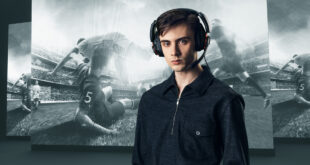Ian Livingstone is a name synonymous with the games industry. That it perhaps brings to most people’s minds someone other than the man behind music scores for titles like Codemasters’ upcoming F1-2010 and Relic’s Company of Heroes: Opposing Fronts is a fact not lost that Ian Livingstone.
It is also unlikely to be something that keeps him awake at night. With a long list of top quality work to his name, that Ian Livingstone is an established and respected entity in game music.
When Develop sat down with him, we were keen to find out about the path that got him to where he is today.
How did you get started in composing
for games?
After taking a degree in music in the early ‘90s at Salford University I became involved in various areas of music production, ranging from in-house sound engineer to touring Europe as session musician with a couple of signed bands. Then purely by chance – an equipment sale to a guy via local free-ads paper Loot – I became introduced to a local developer Warthog and ended up composing for about five of their early projects including Microsoft’s Starlancer. I’ve since scored over 100 titles.
What titles are you working on at the moment?
I’ve just finished F1 2010 for Codemasters – this was actually my second F1 title as I worked on another in the late 90s. But time around we took a more cinematic approach – it’s a mixture of traditional electronic tech mixed with big thematic rousing strings – which I recorded live at Abbey Road. It’s fairly heroic but not in an ‘epic horns’ gladiatorial kind of way, but more classy lush rich and expensive approach.
I’m also just finishing off on Create for Electronic Arts which is a complete contrast – it’s aimed at a much younger audience and the music is completely adaptive. The audio team are working in wWise and we’ve really gone to town on the number of layers with the way the intensity builds depending on how complex the world you’re building becomes. For that one the number of genres is huge – ranging from spooky gothic, ‘50s
sci-fi, hip-hop, ‘80s synth pop, swashbuckling action, fairground, Chinese and Japanese ethnic flavours, etc.
I’ve been lucky enough to work with some world-class session musicians and the whole project has just been a total blast going to town within all of those styles.
How does recording an orchestra at Abbey Road compare to it in Eastern Europe?
Cost-wise the difference isn’t as big as it used to be, with current exchange rates. I’ve recorded in Moscow, Bratislava, most recently on additional music for Napoleon: Total War; in Prague for Company Of Heroes: Opposing Fronts, and in London recently with F1 and also Battlefield 1943 at Abbey Road.
There are some fantastic musicians in Eastern Europe but the quality of the instruments can sometimes let them down, and although the sessions in UK are shorter, the players over here are red-hot and can sight incredibly complex music in just one take. I’ve had problems sometimes in the past with brass in Eastern Europe too and the tuning at 442 instead of 440 can cause nightmares.
How do you realise your scores from initial demos to final production?
I’m always pushing games developers to take the plunge and work with as many live players as possible. Even if it’s just a soloist or small string section, it can make such a difference to the emotion of a score.
However not every project has the time or budget to record full orchestra. I’m totally passionate about making my midi mock-ups sound as real as possible – to the point that I recorded my own custom sampling library together with a small bunch of other media composers in Utah.
We were frustrated by the sterility of perfectly in-tune and noise reduced commercial libraries available at the time so shared the cost and editing time – and I’m still constantly re-programming it to this day. Elaborate midi mock-ups are a vital part of the process for both games and film – I was hired last year to produce the midi mock-ups for the Harry Potter and the Half Blood Prince movie prior to recording at Abbey Road, so the director and producers could hear a very good approximation of how it would sound before they recorded a single note.
So in that instance the mock-ups were part of the pre-production process rather than end-result, although often if the budget just isn’t available to record everything live it’s obviously always good to have as close as possible to the real thing.

 MCV/DEVELOP News, events, research and jobs from the games industry
MCV/DEVELOP News, events, research and jobs from the games industry


